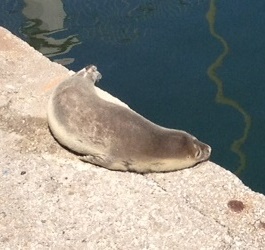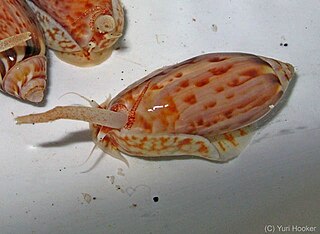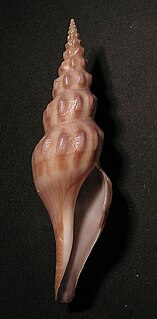
The gastropods, commonly known as snails and slugs, belong to a large taxonomic class of invertebrates within the phylum Mollusca called Gastropoda.

The hooded vulture is an Old World vulture in the order Accipitriformes, which also includes eagles, kites, buzzards and hawks. It is the only member of the genus Necrosyrtes, which is sister to the larger Gyps genus, both of which are a part of the Aegypiinae subfamily of Old World vultures. It is native to sub-Saharan Africa, where it has a widespread distribution with populations in southern, East and West Africa. It is a scruffy-looking, small vulture with dark brown plumage, a long thin bill, bare crown, face and fore-neck, and a downy nape and hind-neck. Its face is usually a light red colour. It typically scavenges on carcasses of wildlife and domestic animals. Although it remains a common species with a stable population in the lower region of Casamance, some areas of The Gambia, and Guinea-Bissau, other regions such as Dakar, Senegal, show more than 85% losses in population over the last 50 years. Threats include poisoning, hunting, loss of habitat and collisions with electricity infrastructure, and the International Union for Conservation of Nature has rated its conservation status as "critically endangered" in their latest assessment (2017). The highest current regional density of hooded vultures is in the western region of The Gambia.

The Hawaiian monk seal is an endangered species of earless seal in the family Phocidae that is endemic to the Hawaiian Islands.

Monk seals are earless seals of the tribe Monachini. They are the only earless seals found in tropical climates. The two genera of monk seals, Monachus and Neomonachus, comprise three species: the Mediterranean monk seal, Monachus monachus; the Hawaiian monk seal, Neomonachus schauinslandi; and the Caribbean monk seal, Neomonachus tropicalis, which became extinct in the 20th century. The two surviving species are now rare and in imminent danger of extinction. All three monk seal species were classified in genus Monachus until 2014, when the Caribbean and Hawaiian species were placed into a new genus, Neomonachus.

The Mediterranean monk seal is a monk seal belonging to the family Phocidae. As of 2015, it is estimated that fewer than 700 individuals survive in three or four isolated subpopulations in the Mediterranean, (especially) in the Aegean Sea, the archipelago of Madeira and the Cabo Blanco area in the northeastern Atlantic Ocean. It is believed to be the world's rarest pinniped species.

The Caribbean monk seal, also known as the West Indian seal or sea wolf, was a species of seal native to the Saint Kitts and Nevis, and is now believed to be extinct. The main predators of Caribbean monk seals were sharks and humans. Overhunting of the seals for oil, and overfishing of their food sources, are the established reasons for the seals' extinction. The last confirmed sighting of the Caribbean monk seal was in 1952 at Serranilla Bank, between Jamaica and Nicaragua. In 2008, the species was officially declared extinct by the United States, after an exhaustive search for the seals that lasted for about five years. This analysis was conducted by the National Oceanic and Atmospheric Administration and the National Marine Fisheries Service. Caribbean monk seals were closely related to Hawaiian monk seals, which live around the Hawaiian Islands and are now endangered, and Mediterranean monk seals, another endangered species.

Ras Nouadhibou is a 60-kilometre (37 mi) peninsula or headland divided by the border between Mauritania and Western Sahara on the African coast of the Atlantic Ocean. It is internationally known as Cabo Blanco in Spanish or Cap Blanc in French.

Cypraeoidea, the cowries and cowry allies, is a superfamily of sea snails, marine gastropods included in the clade Littorinimorpha. This superfamily had been called Cypraeacea and was named by Rafinesque in 1815.

Neritidae, common name the nerites, is a taxonomic family of small to medium-sized saltwater and freshwater snails which have a gill and a distinctive operculum.

Olivoidea is a taxonomic superfamily of minute to medium-large predatory sea snails, marine gastropod mollusks in the clade Neogastropoda.

Plesiotrochidae is a family of sea snails, marine gastropod molluscs in the clade Sorbeoconcha. According to the taxonomy of the Gastropoda by Bouchet & Rocroi (2005) the family Plesiotrochidae has no subfamilies.
Strictispiridae is a taxonomic family of small predatory sea snails, marine gastropod mollusks in the superfamily Conoidea, the cone snails and their allies.

Comitas peelae is a species of sea snail, a marine gastropod mollusk in the family Pseudomelatomidae, the turrids and allies.

Megasurcula tremperiana is a species of sea snail, a marine gastropod mollusk in the family Pseudomelatomidae, the turrids and allies.
Fusus monachus is a species of sea snail, a marine gastropod mollusk in the family Fasciolariidae, the spindle snails, the tulip snails and their allies.

Plesiotrochus souverbianus is a species of sea snail, a marine gastropod mollusk in the family Plesiotrochidae.

Plesiotrochus is a genus of sea snails, marine gastropod mollusks in the family Plesiotrochidae.

Pionoconus is a subgenus of sea snails, marine gastropod mollusks in the genus Conus, family Conidae, the cone snails and their allies.
Calliostoma hernandezi is a species of sea snail, a marine gastropod mollusk in the family Calliostomatidae.

Conus monachus, common name the monastic cone, is a species of sea snail, a marine gastropod mollusk in the family Conidae, the cone snails, cone shells or cones.
















